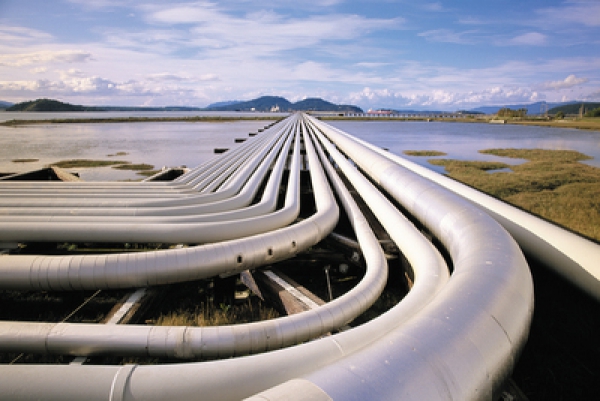Geoscience: Ups and downs
Unsettled markets lead to shifting employment prospects for petroleum geoscientists.
Steep declines in oil prices have decimated oil companies' profits and squeezed a once-booming demand for petroleum geoscientists. In a one-two punch, the price of oil plunged to a 12-year low and energy companies were forced to shed tens of thousands of jobs and slash their oil- and gas-exploration budgets.
The situation is the worst for some time. In January, the price of oil fell to less than US$28 per barrel, down from more than $100 per barrel in 2014 — squashing short-term employment prospects for geologists and geophysicists. Shell, one of the sector's largest companies, has already announced the loss of about 10,000 jobs, and its competitors Chevron and BP have also revealed cuts that number in the thousands. Worldwide, graduate programmes that for decades have been the leading suppliers of talent to energy companies can no longer instantly place their freshly hatched master's-level geoscientists.
Steve Satushek/Getty
A petroleum pipeline at Anacortes, Washington.
“We've had at least a 50% drop in hiring — some major companies are not hiring at all,” says Maurine Riess, director of the geosciences career centre at the University of Texas at Austin, which historically has been a main pipeline for energy-company recruitment. And the master's programme in integrated petroleum geoscience at the University of Aberdeen, UK, another long-time provider, has also felt the impact: last year, one-quarter of its graduates could not immediately get industry jobs. Some of those who were hired elsewhere found roles in risk analysis or finance — fields that are distant from those in which they have trained.
Energy analysts predict a dim outlook for those seeking positions in geoscience for at least the next year (see 'Survival tips for petroleum geoscientists'). But demand for expertise in geology and geophysics is expected to grow in the longer term across the oil and gas industries owing to a pending wave of retirements, a growing demand for technical and leadership skills and a continuing need for oil. Analysts also foresee an increasing demand for this expertise in the environmental sector, notably in impact mitigation — the development and implementation of ways to reduce or eliminate the effects of oil and gas exploration and extraction on the environment.
Energy uncertainty
Instability is not unusual in the energy sector, and this most recent decline in the price of oil is due, very simply, to a glut of oil on the market. Between 2000 and 2008, the price of oil rose sharply and peaked at a record high of almost $150 per barrel. But then a global recession sent the price down to about $40 per barrel by the end of 2008. Although the subsequent economic recovery lifted the price over the next five years, by mid-2014, the price began to drop once more as demand decreased. And at the same time, production has risen in the Middle East, the United States and Canada. These factors have combined to create an unusual excess of oil.
Boom–bust cycles in the sector have produced an uneven workforce demographic that could actually mean good news for early-career geologists over the next five to ten years. The American Geosciences Institute (AGI) in Alexandria, Virginia, a network of associations that represents geoscientists, foresees a shortage of at least 135,000 professionals in the United States by 2022. Its forecast derives in part from the fact that many US geoscientists will soon be at or near retirement age. In academia, for example, the average faculty member in the United States is aged 60. “Half the industry's workforce is retiring in the next several years — with or without the downturn. That's a pretty big human-capacity gap that will have to get filled,” says Christopher Keane, the AGI's director of communications and technology.
And despite the present oversupply, energy companies must still pursue a certain level of oil exploration to remain profitable, says Stephen Barnes, director of the Economics and Policy Research Group at Louisiana State University in Baton Rouge. Barnes, who tracks the workforce needs of the oil industry, says that the discovery of new oil fields, a chief component of exploratory missions, requires a high level of expertise. Keane says: “The million-dollar question — and we can't answer this because companies hold that info tight — is, how many companies prepare for a rebound ahead of time and staff accordingly?” Barnes adds that when the demand for new recruits ramps up, skilled geoscientists are likely to be sought first because their specialized knowledge will be required for exploratory missions.
Early-career geoscientists should be aware that opportunities in the field will rise and fall with the price of oil. “The only constant in this industry is change, so be comfortable with that,” says Carlos Dengo, director of the Berg-Hughes Center for Petroleum and Sedimentary Systems at Texas A&M University in College Station. Here are some tips for working in the sector.
The pending retirement wave and a closer focus on climate change and environmental issues, notably in the area of mitigation, will open up opportunities for geoscientists. And the environmental implications of oil exploration and extraction will be an important driver of workforce demand in the near future, predicts Carlos Dengo, a former ExxonMobil executive and current director of the Berg-Hughes Center for Petroleum and Sedimentary Systems at Texas A&M University in College Station.
Those who focus on subsurface geology have the expertise to develop climate-change mitigation strategies such as carbon capture and storage (CCS), which aims to trap carbon dioxide underground to reduce atmospheric levels of greenhouse gases. “There is no way the world can meet greenhouse-gas emission goals without CCS,” says Philip Ringrose, a specialist in CO2 storage and petroleum geoscience at Statoil in Trondheim, Norway.
At the moment, no one can pinpoint if or when the demand will ramp up. The cost of CCS — and a lack of clarity over who will pay for and insure projects — has meant that its adoption has been uneven. Last November, the UK government cancelled its £1-billion ($1.4-billion) proposed investment in CCS, but both Norway and Canada have government-funded CCS projects under way. Despite the uncertainty, says Ringrose, research funding for CCS has been increasing worldwide.
While the energy sector is in a downturn, geoscientists can look to other fields, Keane points out. In previous periods of decline, their geospatial skills were in demand from the telecommunications industry for the siting of mobile-phone networks, and their proficiency in quantitative-problem management made them highly sought after by finance companies.
Beyond geoscience
Some energy analysts have questioned whether academia can produce the expertise that industry, governments and the non-profit sector will need over the next decade or so, given the ageing workforce and anticipation that the demand for training will exceed the capacity of existing programmes. The overall proportion of US federal funding that is allocated to academic geoscience research has fallen by half since the 1980s, when it represented 11% of basic-research funding. And any specific increases in funding for geoscience research have gone to the environmental or atmospheric sciences. The problem is exacerbated by the fact that geoscience departments in US and UK universities tend to rely on funding from the oil and gas industries, and that typically dwindles during downturns.
“When I started at Texas A&M 2 years ago, my centre had funding for 11 fellowships that came directly from industry. For 2016, I've got 4,” says Dengo. Up to 100 of the more than 400 geoscience master's programmes in the United States now produce most of the new employees for the oil and gas industries.
According to Dengo, these industries want to stop their pattern of slashing support during downturns, which compromises the interest and training of geoscientists. Some companies are eager to support efforts that combine industry and academic expertise to train PhD students. “We sponsor quite a lot of students and use that programme to find the ones we want to employ,” says Jonathan Craig, senior vice-president for exploration at Eni, an oil and gas company in Milan, Italy. And industry support has facilitated the creation of a training initiative in the United Kingdom. Eleven energy companies have contributed financially to the Natural Environment Research Council Centre for Doctoral Training (CDT) in Oil and Gas, located at Heriot-Watt University in Edinburgh, UK, where the British Geological Survey is also relocating 160 of its geoscientists.
" Despite the ups and downs of this industry, it is surprising how much geoscience skills remain in demand. "
With an investment of £10 million from the Natural Environment Research Council, industry and 17 universities, the CDT will produce at least 120 PhD graduates by 2021. Students conduct research and receive 20 weeks of training from industry experts who address the use of oil, energy regulation and the environmental impact of oil-related activities, among other topics.
Early-career geoscientists who receive training in these fundamentals could have an edge in the job market. CDT director John Underhill says that many industry executives complain that today's workforce lacks such a knowledge base. Four areas in particular — stratigraphy, structural geology, sedimentology and field geology — need to be bolstered to escape what he calls 'Nintendo' geology, an over-reliance on 3D mapping and visualization techniques.
Beyond a solid foundation in core geology, the most marketable geoscientists will also have strong quantitative and soft skills, which include communication, the ability to work in a team and sensitivity towards other cultures. To that end, Dengo has created three part-time teaching positions at Texas A&M that he will fill with former industry executives who can share their global experience and business acumen, as well as their specific areas of expertise.
The fundamental proficiency of geoscientists, their ability to remotely detect and assess what is happening within Earth, will prove most desirable both to employers in and outside the energy sector. “Despite the ups and downs of this industry, it is surprising how much geoscience skills remain in demand, even during difficult times,” says Ringrose.
Latest from Redaction Web 1
- اعلان عن تنضيم دورة لإجراء المسـابقـات و الامتحانات والفحوص المهنيـة - دورة 12 -13 ديسمبر 2025
- فتح باب الترشح للالتحاق بالتكوين بالماستر بفئة الطلبة المتخرجين من جامعة قسنطينة 1 الاخوة منتوري دفعة 2025 وفئة %20
- منح دراسية مقدّمة من طرف جامعة حلوان
- برنامج تدّريبي مقدّم من طرف الوكالة الشّيلية للتّعاون الدّولي من أجل التّنمية (AECID)
- عرض منح دراسية في اليابان "2025 ABE Initiative"








